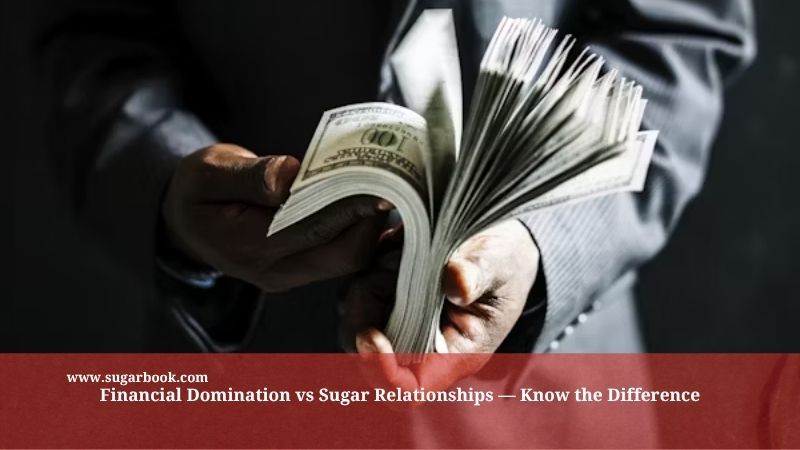
Meet successful sugar daddies and confident sugar babies on the world’s leading sugar dating app. Join free today.
In the world of modern relationships, terms like financial domination and sugar dating often get confused. From the outside, both may appear to involve financial exchange, but the intentions, boundaries, and emotional dynamics are radically different.
Understanding the financial domination difference is essential for anyone exploring consensual, modern arrangements, especially on platforms like Sugarbook, where mutual respect and transparency are core values.
So what exactly sets these two apart? Let’s take a closer look at what financial domination is, how it contrasts with sugar relationships, and why it’s important to distinguish kink from connection.
Contents
- Financial Domination Defined
- Power Play vs Mutual Benefits
- Sugar Relationships = Consent & Respect
- Myths Debunked About Financial Domination and Sugar Dating
- Financial Domination Difference: Summary Table
- Why Platforms Like Sugarbook Offer Safer Alternatives
- Conclusion: Empowerment Through Clarity in Modern Relationships
Financial Domination Defined
What Is Financial Domination?
Financial domination, often abbreviated as findom, is a fetish or kink dynamic where one person (the submissive) willingly gives money or gifts to another person (the dominant) in exchange for feelings of humiliation, control, or psychological excitement.
It’s not about traditional romance or emotional companionship, it’s about power play and control, often conducted entirely online.
Roles: FinDom and Paypig
The roles are quite specific:
-
FinDom or FinDomme: The dominant figure, who demands or accepts tribute in exchange for dominance.
-
Paypig, Cash Slave, or Financial Submissive: The submissive partner who finds pleasure in being “used” financially.
This power dynamic thrives on asymmetry — the FinDom holds control, and the submissive willingly relinquishes financial power.
Platforms Where Financial Domination Happens
Most findom interactions occur through:
-
Twitter/X and Reddit communities
-
Cam sites and fetish forums
-
Direct payment platforms (like CashApp or crypto)
-
Clip-selling platforms with tribute requirements
Unlike sugar dating platforms like Sugarbook, these interactions typically do not involve real-life meetings or emotional development.
Power Play vs Mutual Benefits
One-Way Control in Financial Domination
Financial domination is not a relationship in the traditional sense. It’s a one-way transfer of power, and often of money. The submissive does not expect affection or companionship — just the thrill of losing control.
The emotional high comes from submission, degradation, or financial surrender.
While this is consensual in many cases, it’s also high-risk, especially with unverified participants, scams, and emotional manipulation.
Balanced Dynamics in Sugar Dating
In contrast, sugar relationships prioritize mutual benefit and honest communication. While one partner may provide financial or lifestyle perks, the other offers companionship, affection, or mentorship.
Both parties understand and agree on:
-
Expectations
-
Boundaries
-
Time commitments
-
Emotional connection
Sugar relationships are not built on humiliation or dominance — they’re relationships of arrangement with clearly defined roles and respect.
How Sugarbook Encourages Consent-Based Arrangements
Sugarbook champions relationships where:
-
Consent is discussed and honored
-
Mutual gains are acknowledged
-
Emotional and lifestyle alignment is prioritized
The platform provides tools to support open communication, safe interactions, and consensual arrangements — distancing itself from the risk-heavy dynamics of financial domination.
Sugar Relationships = Consent & Respect
Emotional Safety in Sugarbook Relationships
Unlike the often anonymous nature of findom, sugar dating via Sugarbook involves profile verification, identity clarity, and the option for offline meetups, all promoting emotional safety.
Sugarbook relationships are:
-
Goal-oriented
-
Emotionally open (to varying degrees)
-
Structured and transparent
Transparency in Expectations and Boundaries
A sugar couple might agree on:
-
Weekly meetups
-
Travel arrangements
-
Gift or allowance structures
-
Communication styles
This open communication sets the stage for a healthy arrangement, rather than one-sided exploitation seen in some findom cases.
Mutual Gains vs Power Exchange
At its best, financial domination is a psychological game between consenting adults. But it lacks the depth, balance, and structure that sugar relationships offer.
Sugar dating, by contrast, allows for:
-
Emotional compatibility
-
Lifestyle enhancement
-
Intellectual stimulation
-
Romance and intimacy
It’s not about power — it’s about partnership.
Myths Debunked About Financial Domination and Sugar Dating
“Sugar Dating Is Just Like Findom” – False
One of the most common misconceptions is that sugar dating and financial domination are the same because both involve money. In reality, they are worlds apart in terms of purpose, interaction, and emotional depth.
Sugar dating is centered on mutual attraction, support, and companionship. Financial domination is about control, humiliation, and submission. One is a relationship with benefits; the other is a kink-based dynamic.
“Financial Domination Is Harmless Fun” – Not Always
While some people enjoy financial domination as a form of consensual roleplay, it can quickly become emotionally and financially dangerous, especially when clear boundaries are not set.
There have been cases where paypigs were manipulated into draining savings, taking out loans, or suffering emotional distress — all for an anonymous thrill. This is why education and informed consent are crucial in findom scenarios.
“All Sugar Babies Want to Dominate Financially” – Misconception
Sugar babies are not financial dominants. Most are seeking companionship and support, not control over their partner’s finances. Suggesting that all sugar babies are manipulative or power-hungry is an unfair stereotype.
In fact, sugar relationships often involve deep emotional intelligence, mutual respect, and clearly defined terms that avoid misunderstandings.
Financial Domination Difference: Summary Table
To fully understand the financial domination difference, let’s compare it side by side with sugar relationships:
| Feature | Financial Domination | Sugar Relationships |
|---|---|---|
| Consent Type | Implied in kink, sometimes vague | Explicit and agreed upon |
| Emotional Bond | Rare or non-existent | Often develops naturally |
| Power Dynamic | Dominance/submission | Mutual negotiation |
| Financial Flow | Tribute-based, no exchange | Support with emotional value |
| Safety Level | High risk (scams, coercion) | Safer with platforms like Sugarbook |
| Interaction Mode | Often online-only | In-person or hybrid |
| Transparency | Rarely transparent | Highly encouraged |
Why Platforms Like Sugarbook Offer Safer Alternatives
Sugarbook isn’t a findom site – it’s a sugar dating platform built for real people looking for mutual arrangements, not power plays.
Here’s what makes Sugarbook different:
-
Verified Profiles: Know who you’re talking to.
-
Consent-Focused Culture: Encouraging honesty from day one.
-
Clear Intentions: Profile fields highlight lifestyle goals.
-
Education Resources: Guides on safety, dating etiquette, and sugar culture.
-
Support Tools: Block/report features to keep users safe.
Instead of encouraging risky domination scenarios, Sugarbook promotes balance, emotional connection, and trust.
Conclusion: Empowerment Through Clarity in Modern Relationships
In a digital world where relationships come in many forms, understanding the financial domination difference matters more than ever.
Financial domination is a fetish-driven, power-exchange scenario often misunderstood as a form of dating. While some choose to explore it consensually, it carries inherent risks and lacks the emotional balance of a real relationship.
Sugar relationships, especially those formed through trusted platforms like Sugarbook, offer mutual benefits, emotional growth, and structured agreements that empower both parties.
Clarity, communication, and consent are key. And in that light, sugar dating is not domination — it’s connection with purpose.
FAQ
Q1: What is financial domination (Findom)?
Findom is a fetish where someone gives money for the thrill of being financially controlled, no relationship or benefits expected.
Q2: Is Findom the same as sugar dating?
Nope. Sugar dating involves mutual arrangements, emotional connection, and shared benefits, not power-based control.
Q3: Do sugar babies expect Findom-like money rules?
Real sugar babies don’t. Most want respect, chemistry, and clarity, not financial humiliation or manipulation.
Q4: Why do some sugar daddies get confused by Findom?
Because both involve money, but Findom is a kink, while sugar dating is a relationship model.
Q5: How can I avoid fake Findom traps?
Stick to trusted platforms like Sugarbook, where expectations are real, mutual, and based on genuine interest.
New to money-based dynamics? Learn the right way to determine an allowance.
Spotting red flags early is key, read our guide on fake sugar profiles.
Curious about dominance in sugar dating? Compare dominant vs submissive roles next.













